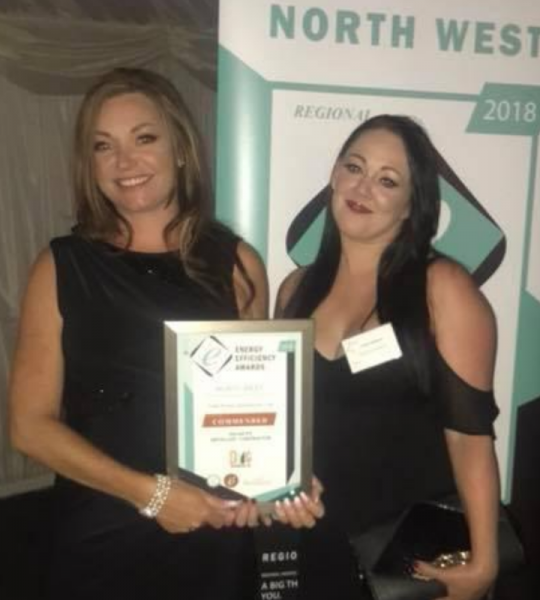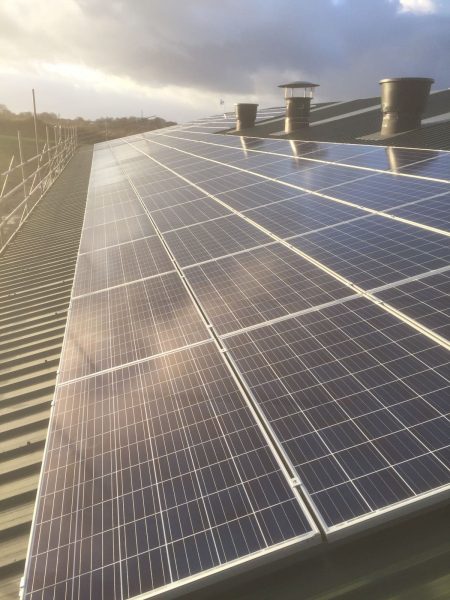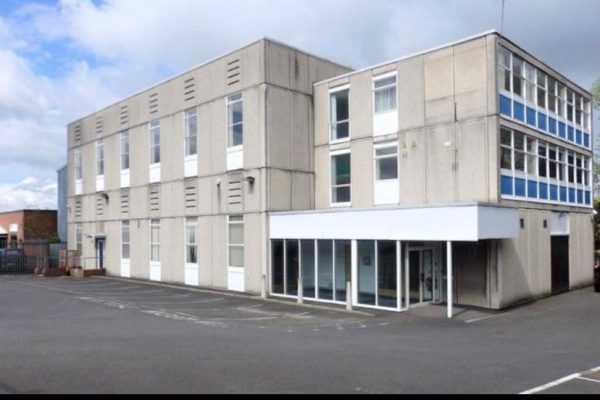The word ‘resilient’ doesn’t begin to describe Laura Waters.
 She’s had more than her share of setbacks since starting Total Power Installations in Carlisle in 2013, supplying and installing solar panels across northern England and southern Scotland. Three years later the Government slashed the feed-in tariffs for solar, driving many installers out of business. Total Power Installations survived.
She’s had more than her share of setbacks since starting Total Power Installations in Carlisle in 2013, supplying and installing solar panels across northern England and southern Scotland. Three years later the Government slashed the feed-in tariffs for solar, driving many installers out of business. Total Power Installations survived.
By 2019, the business was operating from Paton House in Victoria Viaduct. That autumn they had to quit the premises, with almost no notice, because the abandoned Central Plaza Hotel nearby was in a dangerous state.
That led Laura to take a temporary unit in Denton Holme. The business returned to Paton House in March, only to be served notice to quit to make way for the Carlisle Station Gateway redevelopment.
Then, to cap it all, Covid-19 hit.
Laura said: “To be forced out was galling because we’d invested £100,000 in Paton House. Going forward, I wanted more security for the business and that meant buying our own premises.”
It was at this point that she contacted Cumbria Business Growth Hub.
 “I knew all about the Growth Hub,” Laura said. “We’d been on the Business Start-Up Support (BSUS) programme when we started out.
“I knew all about the Growth Hub,” Laura said. “We’d been on the Business Start-Up Support (BSUS) programme when we started out.
“When I found out we were going to be evicted I reached out to our Growth Hub adviser, Alan Smithson, to see if he could get us any help,
“He said yes, Cumbria Local Enterprise Partnership has just released funding. He came to see us and helped us through the application process.”
Total Power Installations secured a £120,000 grant under the Growing Our Potential programme.
This provides grants of between £50,000 and £200,000 to cover up to 40 per cent of the cost of projects that support growth, increase productivity, foster innovation and create jobs.
The grant has enabled Laura to buy, repair and convert a former BT building in Hillcrest Avenue, Carlisle.
Two storeys high, with a three-storey extension, it is large enough to accommodate Total Power Installations and Laura’s other businesses, Laser Quest and Total Enigma escape rooms, also based at Paton House.
She said: “Alan was brilliant. We wouldn’t have been able to do it without the grant. The project is going to cost at least £350,000.
“We’ll have an open-plan office for Total Power Installations and storage on the middle floor, and we’ll be able to move in Laser Quest and Total Enigma and add UV glow-in-the-dark indoor golf, which will be easy to operate with social distancing if the Covid-19 restrictions stay with us.
 “Under the terms of the grant, we have to spend the money by the end of the year so we’re pushing ahead to get it done.”
“Under the terms of the grant, we have to spend the money by the end of the year so we’re pushing ahead to get it done.”
The business looks to a have a bright future. The move will allow it to expand to meet rising demand for solar power in response to concerns about climate change and government targets to cut carbon emissions.
Laura said: “I’m looking to recruit a sales manager, a project manager and an installation team – previously we’ve subcontracted installation.
“We’ve also started the process of gaining PAS 2035 accreditation, the standard for energy retrofit of domestic buildings.
“This will enable us to offer loft insulation, replacement of electric heaters and the like when the Government’s Green Homes Grant starts in September.”
Find out how Cumbria Business Growth Hub can help your business. Call us today on 0844 257 84 50 or email info@cumbriagrowthhub.co.uk
![]() The funding that supports the Growth Hub comes from a range of sources including Cumbria Chamber of Commerce, the European Regional Development Fund, Sellafield Ltd., Carlisle City Council, South Lakeland District Council, Penrith Industrial BID and Cumbria LEP. The Growth Hub and is receiving up to £2,528,767 of funding from the England European Regional Development Fund as part of the European Structural and Investment Funds Growth Programme 2014-2020. The Ministry for Housing Communities and Local Government is the Managing Authority for European Regional Development Fund. Established by the European Union, the European Regional Development Fund helps local areas stimulate their economic development by investing in projects which will support innovation, businesses, create jobs and local community regenerations. For more information, click here.
The funding that supports the Growth Hub comes from a range of sources including Cumbria Chamber of Commerce, the European Regional Development Fund, Sellafield Ltd., Carlisle City Council, South Lakeland District Council, Penrith Industrial BID and Cumbria LEP. The Growth Hub and is receiving up to £2,528,767 of funding from the England European Regional Development Fund as part of the European Structural and Investment Funds Growth Programme 2014-2020. The Ministry for Housing Communities and Local Government is the Managing Authority for European Regional Development Fund. Established by the European Union, the European Regional Development Fund helps local areas stimulate their economic development by investing in projects which will support innovation, businesses, create jobs and local community regenerations. For more information, click here.
